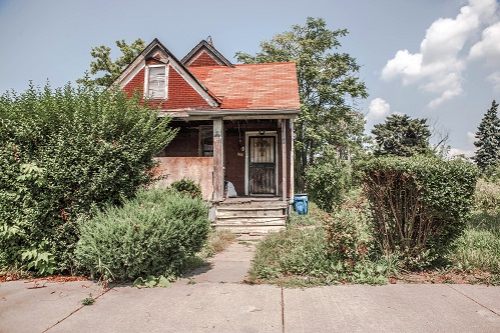- What is the matching problem?
- Do insurance companies have to match siding?
- What are matching laws for home insurance?
- Which states are matching states for insurance?
- What is a matching endorsement on insurance?
- How to negotiate for full replacement on an insurance claim
- Claim disputes and resolution
- FAQ: Matching coverage on home insurance
What is the matching problem?
The matching problem in property insurance claims arises when an insurer must decide whether to repair or replace property that isn’t directly damaged by a covered cause of loss but is affected by the loss. This issue frequently comes up with windstorm damage to siding and roofing. If only one section has been damaged, the insurance company won't normally replace the undamaged portion; however, if matching materials can't be found, the insurer can't restore the home to it's pre-loss condition.
So, for example, if you have damaged shingles on your roof but the manufacturer has discontinued your shingles, the homeowners insurance company can either try to find a match in another shingle or, if that's not possible, replace the entire roof. Obviously, that's much more costly to the insurance company, but it may be required.
Do insurance companies have to match siding?
Insurance companies have to match siding if it's required by your policy or by state law. Generally, if matching is required, the contractor or homeowner will have to prove that replacing just the damaged section of the siding will not match. That could be due to the fact that the other siding has faded or that the siding used when the house was built is no longer available.
People ask
Will insurance pay to replace the entire floor?
If your flooring is damaged, insurance will likely replace the entire floor unless it's possible to replace the damaged section with matching flooring. With wall-to-wall carpet, it's not possible to replace just a section. You may need a matching endorsement to ensure continuous flooring insurance coverage.
What are matching laws for home insurance?
In some states, the law requires the insurance company to ensure everything matches. In Florida, for example, if replaced items don't match in quality, color, or size, the insurance company must make "reasonable repairs or replacement of items in adjoining areas." to ensure a reasonably uniform appearance.
The appearance should be uniform within the line of sight. Inside, that could mean replacing the entire floor of a room, even if only a portion needs repair.
While not every state has such rules, some carriers have added non-matching language to policies and introduced endorsements, or insurance add-ons, to cover matching.
Which states are matching states for insurance?
These states have laws on the books relating to matching materials when completing claim repairs:
- Alaska
- California
- Connecticut
- Florida
- Iowa
- Kentucky
- Louisiana
- Montana
- Nebraska
- Ohio
- Rhode Island
- Tennessee
- Utah
- Vermont
- West Virginia
- Wisconsin
What is a matching endorsement on insurance?
Matching coverage is a fairly low-price add-on to your home insurance that ensures that when you file a claim for your roof, siding or windows, the surrounding undamaged roof, siding or windows will, if needed, be replaced with materials that match. Matching roofing is a common issue, as insurers may resist replacing undamaged sections solely to maintain uniformity.
American Family Insurance, for instance, offers the "Matching Undamaged Siding and Roof Coverage" endorsement, which covers up to $20,000 of the cost to update with new materials the undamaged siding or roofing if there's a mismatch when repairs are made. The endorsement costs $25 a year.
Even in states where insurance companies are required by law to make everything match, company adjusters often push for less-expensive patching and resist full replacement, according to United Policyholders, a San Francisco-based consumer advocacy group.
"It's not a slam dunk," Reitz says. "They balk, but when you press, they'll give in. The argument I generally make is it all matched before, so it should match now."
Reitz says there's less push-back from insurers about replacing an entire counter or floor than replacing a roof or all the siding.
How to negotiate for full replacement on an insurance claim
If you aren't happy with the insurance company's offer to repair your home, you have the right to negotiate. Here's what you can do.
- Hire a lawyer. In a worst-case scenario, you may have to hire a lawyer to get the insurance company to pay.
- Speak with your adjuster. Ask the adjuster what you need to do to prove that matching is required or that matching is not being accomplished. You may need to take pictures or send samples of the materials.
- Get your contractor involved. Contractors have experience dealing with insurance companies and negotiating to get matching coverage.
- Ask for a supervisor. If you can't get anywhere with the adjuster, ask what you can do to escalate the situation to a higher level. A supervisor or manager may be able to make decisions the adjuster can't or won't.
- Hire a public adjuster. Public adjusters work on your behalf to get the most from your claim. You'll have to pay a fee, which is generally a percentage of the claim settlement.
Claim disputes and resolution
You have the right to dispute your claim settlement. If you believe the homeowners insurance company needs to replace the entire roof, for example, because matching shingles aren't available, but the company only wants to replace damaged areas, you can appeal.
Every insurance company has a process for resolving claims disputes. Before you file a dispute, however, it's important to understand the terms of your homeowners insurance policy. If matching coverage isn't included and isn't require by your state, you may not get anywhere with the appeal.
FAQ: Matching coverage on home insurance
How do home insurance companies determine replacement costs for damages?
The full replacement cost for damage is determined by taking into account the following factors:
- The details of your home, such as its age, location, flooring, and features like vaulted ceilings and crown moldings
- Building material costs
- Labor costs in the area
Do insurance companies have to match siding due to fading?
If you live in a state with matching laws or have an endorsement on your policy, your insurance company will have to replace all of your siding if it has faded enough that it's not possible to match new sections with the old.





